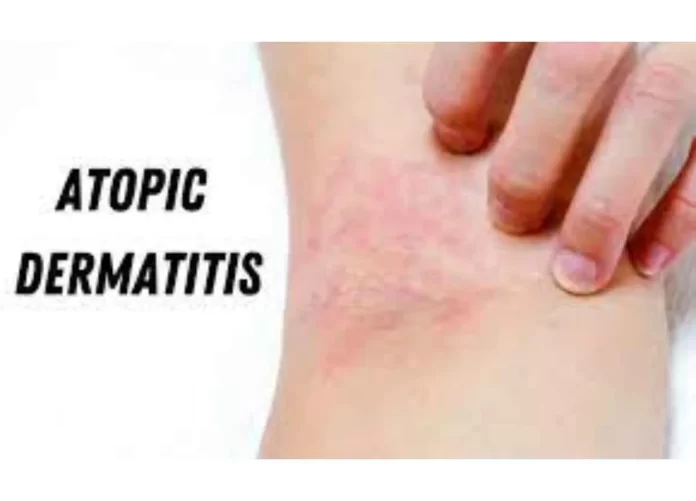Atopic dermatitis, often referred to as eczema, is a chronic inflammatory skin condition characterized by itchy, red, and inflamed skin. It commonly appears in childhood but can persist or even develop later in life. Here’s an overview of its symptoms, causes, treatment, and prevention:
Symptoms:
- Itching (pruritus): Itching is the hallmark symptom of atopic dermatitis and can be intense, leading to scratching and further skin irritation.
- Redness (erythema): The affected skin often appears red or flushed.
- Dryness: Skin affected by eczema tends to be dry, rough, and scaly.
- Inflammation: Inflammation may cause swelling and discomfort.
- Cracking and oozing: In severe cases, the skin may crack, weep, or ooze fluid.
- Thickened skin: Chronic scratching can lead to thickening of the skin, known as lichenification.
Causes:
- Genetics: Atopic dermatitis tends to run in families, suggesting a genetic predisposition.
- Immune system dysfunction: The immune system plays a role in triggering inflammation in response to certain triggers, leading to eczema flare-ups.
- Environmental factors: Allergens, irritants, extreme temperatures, and humidity can exacerbate symptoms.
- Skin barrier dysfunction: People with eczema often have a compromised skin barrier, which allows irritants and allergens to penetrate the skin more easily.
Treatment:
- Topical corticosteroids: These anti-inflammatory creams or ointments are commonly prescribed to reduce inflammation and itching during flare-ups.
- Moisturizers: Regular use of moisturizers helps to hydrate the skin and maintain its barrier function.
- Topical calcineurin inhibitors: These medications help reduce inflammation and are often used in sensitive areas like the face and groin.
- Antihistamines: Oral antihistamines can help relieve itching and improve sleep quality, especially if itching is interfering with rest.
- Phototherapy: In some cases, exposure to ultraviolet (UV) light under medical supervision can help improve symptoms.
- Immunomodulators: Drugs that modulate the immune system, such as cyclosporine or dupilumab, may be prescribed for severe cases.
Prevention:
- Avoid triggers: Identify and avoid triggers that exacerbate eczema symptoms, such as certain fabrics, harsh soaps, or allergens.
- Maintain skin hydration: Regularly moisturize the skin to prevent dryness and reinforce the skin barrier.
- Manage stress: Stress can worsen eczema symptoms, so practicing stress-reduction techniques like mindfulness or yoga may help.
- Use gentle skincare products: Choose mild, fragrance-free skincare products to minimize irritation.
- Manage allergies: If allergies contribute to eczema flare-ups, work with a healthcare provider to manage them effectively.
































